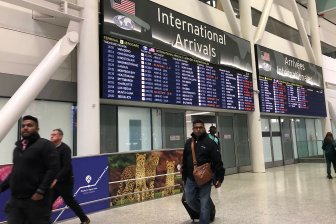The long-awaited inquiry into foreign interference is giving groups until the middle of next week to apply to participate in its deliberations.
A notice posted to the Public Inquiry into Foreign Interference in Federal Electoral Processes and Democratic Institutions on Friday said individuals and groups seeking to participate in the probe have until Nov. 22 to apply.
That gave just 12 days for groups hoping to have “standing” in the inquiry to “demonstrate a direct and substantial interest in the subject matter,” the notice read.
The tight timeline is reflective of the overall pressure Justice Marie-Josée Hogue is under to investigate the complex issue of foreign governments interfering in Canadian politics, society and institutions.

“What can be predicted is that there will be little time or room for other deliberations in the public hearings prior to the completion of the commission’s first report. And damn little time for the completion of the first report,” Wesley Wark, a fellow at the Centre for International Governance Innovation who has long followed Canadian national security issues, wrote in a Sunday evening newsletter.
The inquiry’s notice quoted Hogue as saying they intend to “set tight but fair deadlines” for participants.
Hogue was appointed by the government in early September, with a mandate to complete an interim report by the end of next February. A final report is required by the end of 2024.
That gives Hogue and her team the next 13 months to investigate extremely complex issues, like alleged meddling by China and Russia in recent federal elections and how federal agencies responded to those threats, as well as to hold public hearings, hear from expert witnesses and come up with recommendations to harden Canada’s defences against foreign interference.
“The commission will also examine the flow of information within the federal government in relation to these issues, evaluate the actions taken in response, assess the federal government’s capacity to detect, deter, and counter foreign interference, and make recommendations on these issues,” the inquiry wrote.

Hogue was appointed by the Liberal government in September after months of searching for a judge to lead the inquiry, as well as discussions with senior members of opposition parties on the shape of the inquiry.
The Liberals were forced to find a new lead for the probe after former governor general David Johnston, assigned as a “special rapporteur” into foreign interference, resigned from his post over accusations of bias and a too-close connection to Prime Minister Justin Trudeau and his family.
Johnston’s final June 2023 report argued a formal inquiry into foreign interference was not necessary, but that foreign governments are “undoubtedly attempting to influence candidates and voters in Canada.”
“This is a growing threat to our democratic system and must be resisted as effectively as possible by government,” the report read.
“Much has been done already, but considerably more remains to be done to strengthen our capacity to resist foreign interference.”
The report also found “serious shortcomings” in how top-secret information is shared within government from security and intelligence agencies to their political masters.
Johnston’s conclusion – that a public inquiry was not necessary, and would be limited in what it could release publicly due to the top-secret nature of the intelligence involved – was not accepted by opposition parties in the House of Commons, who continued to push for a full public inquiry.
The inquiry stated that it “intends to conduct its work in such a way as to maximize the public disclosure of the information it will obtain” without jeopardizing national security. Its first report is due by Feb. 29, 2024.
© 2023 Global News, a division of Corus Entertainment Inc.




